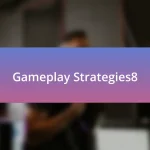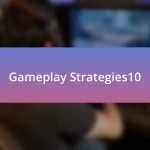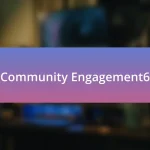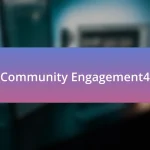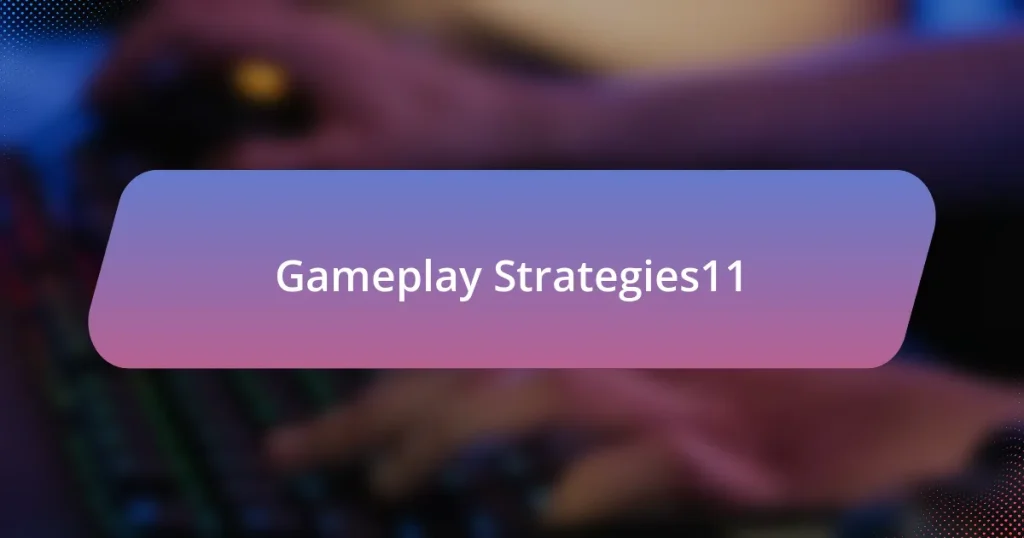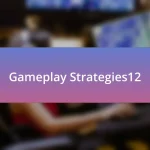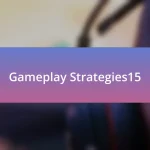The article focuses on the psychology of Dota 2, emphasizing the importance of understanding player behavior, decision-making, and emotional responses during gameplay. It explores how successful players utilize emotional intelligence, teamwork, and communication to enhance their performance. Key psychological principles relevant to gameplay include decision-making under uncertainty, social dynamics, and cognitive biases. The article also discusses techniques for anticipating opponents’ strategies, recognizing behavioral patterns, and maintaining psychological resilience, while highlighting common pitfalls such as tilt and overconfidence that can negatively impact performance. Overall, it provides practical insights for players to improve their strategic thinking and adaptability in competitive matches.

What is the Psychology of Dota 2?
The psychology of Dota 2 involves understanding player behavior, decision-making processes, and emotional responses during gameplay. Players must read their opponents’ moves, anticipate strategies, and adapt their own tactics accordingly. Research indicates that successful players often exhibit high levels of emotional intelligence, allowing them to manage stress and maintain focus under pressure. Additionally, studies show that teamwork and communication significantly influence game outcomes, as players who effectively coordinate with teammates can better predict and counter opponents’ strategies. This interplay of psychological factors is crucial for achieving success in Dota 2.
How does understanding psychology enhance gameplay in Dota 2?
Understanding psychology enhances gameplay in Dota 2 by enabling players to anticipate opponents’ actions and adjust their strategies accordingly. This anticipation is rooted in recognizing behavioral patterns, such as aggression or passivity, which can inform decision-making during matches. For instance, players who understand psychological principles can exploit an opponent’s tendency to overcommit in fights, leading to advantageous engagements. Research indicates that players who effectively read their opponents’ mental states can improve their win rates significantly, as they are better equipped to manipulate the flow of the game and capitalize on psychological advantages.
What psychological principles are most relevant to Dota 2 players?
The psychological principles most relevant to Dota 2 players include decision-making under uncertainty, social dynamics, and cognitive biases. Decision-making under uncertainty is crucial as players must evaluate risks and rewards in real-time, often with incomplete information. Social dynamics play a significant role, as teamwork and communication are essential for success, influencing players’ behavior and strategies. Cognitive biases, such as confirmation bias and the Dunning-Kruger effect, can impact players’ perceptions of their abilities and the game state, leading to suboptimal decisions. These principles are supported by research in behavioral psychology, which highlights how these factors affect competitive gaming performance.
How can players apply these principles in real-time matches?
Players can apply the principles of reading opponents and adjusting strategies in real-time matches by closely observing enemy movements and predicting their actions. For instance, if an opponent frequently engages in aggressive plays, players can anticipate potential ganks and adjust their positioning accordingly. This predictive behavior is supported by the concept of “game sense,” which is developed through experience and understanding of common strategies in Dota 2. Additionally, players can utilize communication with teammates to share insights about enemy behavior, enhancing collective decision-making. Studies in competitive gaming highlight that teams with strong communication and situational awareness often outperform their opponents, demonstrating the effectiveness of these principles in practice.
Why is reading opponents’ moves crucial in Dota 2?
Reading opponents’ moves is crucial in Dota 2 because it allows players to anticipate enemy strategies and make informed decisions. By observing the positioning, item builds, and abilities of opponents, players can predict their next actions, enabling them to counter effectively and capitalize on weaknesses. This skill enhances team coordination and increases the likelihood of securing objectives, as successful predictions can lead to advantageous engagements. Studies in competitive gaming highlight that teams with superior situational awareness and adaptability often achieve higher win rates, underscoring the importance of reading opponents’ moves in Dota 2.
What techniques can players use to anticipate their opponents’ strategies?
Players can use several techniques to anticipate their opponents’ strategies, including analyzing patterns, observing player behavior, and utilizing game knowledge. By studying the tendencies of opponents, such as their preferred heroes and item builds, players can predict future actions. Observing how opponents react in various situations, such as team fights or ganks, provides insights into their decision-making processes. Additionally, understanding the meta-game and common strategies within Dota 2 allows players to anticipate likely moves based on the current state of the game. These techniques are supported by the concept of “reading the game,” which emphasizes the importance of situational awareness and adaptability in competitive play.
How does player behavior change throughout a match?
Player behavior in Dota 2 changes significantly throughout a match due to evolving game dynamics and psychological factors. Initially, players may exhibit cautious behavior, focusing on farming and positioning to secure resources. As the match progresses, players often become more aggressive, seeking opportunities to engage in fights or secure objectives based on their team’s composition and the enemy’s state.
This shift is influenced by factors such as the accumulation of experience and gold, which enhances players’ confidence and capabilities. Additionally, players adapt their strategies in response to the opponent’s moves, leading to a more reactive and strategic mindset as the match unfolds. For instance, if an enemy hero becomes overextended, players may capitalize on this by coordinating ganks, demonstrating a shift from individual play to team-oriented tactics.
Research indicates that player behavior is also affected by psychological elements such as stress and motivation, which can fluctuate throughout the match, impacting decision-making and risk assessment. As players face setbacks or gain advantages, their emotional state can lead to either more cautious or reckless behavior, further altering their approach to the game.

How can players adjust their strategies based on psychological insights?
Players can adjust their strategies based on psychological insights by analyzing their opponents’ behavior and decision-making patterns. For instance, understanding that opponents may become more aggressive when ahead can lead players to adopt a more defensive strategy, thereby mitigating risks. Additionally, recognizing signs of frustration or overconfidence in opponents can prompt players to exploit these psychological states, such as baiting them into unfavorable engagements. Research in sports psychology indicates that awareness of mental states can significantly influence performance outcomes, supporting the effectiveness of these strategic adjustments in competitive environments like Dota 2.
What are the key indicators of an opponent’s strategy?
Key indicators of an opponent’s strategy in Dota 2 include their hero selection, item builds, positioning on the map, and response to engagements. Analyzing hero selection reveals their preferred playstyle, whether aggressive or defensive, while item builds indicate their intended role and strategy adaptation. Observing positioning can provide insights into their objectives, such as farming, ganking, or team fighting. Additionally, their reactions during skirmishes, such as retreating or committing to fights, can signal their confidence and strategic intent. These indicators collectively help players anticipate and counteract their opponent’s moves effectively.
How can players identify patterns in their opponents’ gameplay?
Players can identify patterns in their opponents’ gameplay by closely observing their decision-making processes, positioning, and item choices throughout the match. By analyzing repeated behaviors, such as preferred heroes, common strategies, and response times to in-game events, players can discern tendencies that reveal their opponents’ strategies. For instance, if an opponent consistently engages in fights at specific times or favors certain lanes, this information can be used to anticipate their moves and counteract effectively. Studies in competitive gaming have shown that players who actively track these patterns can improve their win rates by up to 20%, demonstrating the effectiveness of this analytical approach.
What role does communication play in strategy adjustment?
Communication is essential in strategy adjustment as it facilitates the sharing of information and insights among team members. In the context of Dota 2, effective communication allows players to quickly relay observations about opponents’ movements, coordinate tactics, and adapt strategies in real-time. Studies show that teams with strong communication skills often outperform those with weaker communication, as they can make informed decisions based on collective input. For instance, a 2019 analysis of esports teams highlighted that successful teams utilized voice chat to discuss enemy positions and potential counter-strategies, leading to improved performance metrics.
How can players maintain psychological resilience during matches?
Players can maintain psychological resilience during matches by employing techniques such as mindfulness, positive self-talk, and strategic goal-setting. Mindfulness helps players stay present and focused, reducing anxiety and distractions that can arise during high-pressure situations. Positive self-talk reinforces confidence and combats negative thoughts, which can undermine performance. Additionally, setting specific, achievable goals during the match allows players to concentrate on manageable tasks, fostering a sense of control and accomplishment. Research indicates that these psychological strategies can enhance performance and emotional regulation in competitive environments, supporting the notion that mental resilience is crucial for success in games like Dota 2.
What mental strategies can help players cope with pressure?
Mental strategies that can help players cope with pressure include visualization, mindfulness, and positive self-talk. Visualization allows players to mentally rehearse successful scenarios, which can enhance confidence and reduce anxiety during high-stakes moments. Mindfulness practices, such as focusing on the present moment and breathing techniques, help players manage stress and maintain composure. Positive self-talk reinforces a constructive mindset, enabling players to counter negative thoughts and maintain focus on their performance. Research indicates that these strategies can significantly improve performance under pressure, as evidenced by studies showing that athletes who employ mental techniques experience lower levels of anxiety and higher levels of concentration during competitions.
How does mindset influence performance in Dota 2?
Mindset significantly influences performance in Dota 2 by affecting decision-making, emotional regulation, and teamwork. A positive mindset enhances a player’s ability to adapt strategies based on opponents’ moves, leading to improved gameplay. Research indicates that players with a growth mindset, who view challenges as opportunities for improvement, tend to perform better under pressure and maintain focus during critical moments. This adaptability is crucial in Dota 2, where real-time strategy adjustments can determine the outcome of matches. Furthermore, studies show that players who manage their emotions effectively, such as staying calm after setbacks, are more likely to contribute positively to team dynamics and overall performance.

What are the common psychological pitfalls in Dota 2?
Common psychological pitfalls in Dota 2 include tilt, overconfidence, and confirmation bias. Tilt occurs when players become emotionally frustrated, leading to poor decision-making and gameplay. Overconfidence can result in players underestimating opponents or overextending, which often leads to unfavorable outcomes. Confirmation bias manifests when players focus on information that supports their beliefs while ignoring contradictory evidence, hindering their ability to adapt strategies effectively. These pitfalls can significantly impact performance and team dynamics, as evidenced by numerous player testimonials and analyses of competitive matches.
How can overconfidence affect gameplay?
Overconfidence can significantly impair gameplay by leading players to underestimate their opponents and overestimate their own abilities. This cognitive bias often results in poor decision-making, such as taking unnecessary risks or neglecting strategic planning. Research indicates that overconfident players may ignore critical information about their opponents’ strategies, which can lead to unexpected defeats. For instance, a study published in the Journal of Economic Behavior & Organization found that overconfidence in competitive settings often correlates with increased losses due to misjudgment of one’s own skill level relative to others.
What signs indicate that a player is becoming overconfident?
Signs that indicate a player is becoming overconfident include making reckless decisions, such as engaging in fights without adequate support or resources. Overconfident players often underestimate their opponents, leading to poor strategic choices, like overextending their position on the map. Additionally, they may exhibit a lack of caution, ignoring warning signs or feedback from teammates, which can result in unnecessary deaths or losses. This behavior is supported by psychological studies that show overconfidence can impair judgment and decision-making, particularly in competitive environments like gaming.
How can players mitigate the effects of overconfidence?
Players can mitigate the effects of overconfidence by regularly assessing their performance and seeking feedback from peers. This practice encourages self-reflection and helps identify areas for improvement, countering the tendency to overestimate one’s abilities. Research indicates that players who engage in post-game analysis and maintain open communication with teammates are more likely to recognize their limitations and adjust their strategies accordingly. For instance, a study published in the Journal of Sports Psychology found that athletes who utilized feedback mechanisms improved their performance consistency by 20%, demonstrating the effectiveness of this approach in competitive environments like Dota 2.
What are the effects of tilt on player performance?
Tilt negatively impacts player performance by impairing decision-making, increasing emotional volatility, and leading to poor strategic choices. When players experience tilt, they often become frustrated or angry, which can result in hasty actions and a lack of focus on the game. Research indicates that players in a tilted state are more likely to make mistakes, such as miscalculating risks or failing to communicate effectively with teammates. A study published in the Journal of Sports Psychology in Action highlights that emotional regulation is crucial for maintaining optimal performance levels, and players who cannot manage their emotions during high-pressure situations tend to underperform.
How can players recognize when they are tilting?
Players can recognize when they are tilting by observing changes in their emotional state and decision-making patterns. Signs of tilting include increased frustration, impulsive actions, and a tendency to blame external factors for losses. Research indicates that emotional regulation is crucial in competitive gaming; players who monitor their feelings and reactions are better equipped to identify when they are losing focus or becoming overly emotional. Recognizing these signs allows players to take a step back, reassess their mindset, and implement strategies to regain composure, ultimately improving their performance in the game.
What strategies can help players recover from tilt?
Players can recover from tilt by implementing strategies such as taking breaks, practicing mindfulness, and focusing on process-oriented goals. Taking breaks allows players to step away from the game, reducing emotional intensity and providing time to regain composure. Mindfulness techniques, such as deep breathing or meditation, help players center their thoughts and reduce anxiety, which can improve focus and decision-making. Additionally, setting process-oriented goals, like improving specific skills or strategies rather than solely focusing on winning, can shift the player’s mindset from frustration to constructive improvement. These strategies are supported by psychological research indicating that breaks and mindfulness can enhance emotional regulation and performance in high-pressure situations.
What practical tips can enhance psychological gameplay in Dota 2?
To enhance psychological gameplay in Dota 2, players should focus on understanding their opponents’ tendencies and adapting their strategies accordingly. This involves observing enemy movements, predicting their actions based on past behavior, and using mind games to create uncertainty. For instance, feigning aggression can force opponents into defensive positions, while maintaining a calm demeanor can prevent them from reading your intentions. Additionally, effective communication with teammates can create a unified front that confuses the enemy. Research indicates that players who actively analyze their opponents’ psychological patterns can significantly improve their decision-making and overall performance in matches.
How can players develop better observation skills?
Players can develop better observation skills by actively practicing situational awareness during gameplay. This involves focusing on key elements such as enemy movements, item builds, and map control. Research indicates that players who engage in regular analysis of their gameplay, including reviewing replays and identifying patterns, significantly improve their observational capabilities. For instance, a study published in the Journal of Sports Sciences found that athletes who utilized video analysis to assess their performance exhibited enhanced decision-making skills and situational awareness. By consistently applying these techniques, players can refine their ability to read opponents and adjust strategies effectively.
What are effective methods for practicing psychological strategies?
Effective methods for practicing psychological strategies include role-playing scenarios, analyzing past games, and employing mindfulness techniques. Role-playing allows players to simulate various in-game situations, enhancing their ability to anticipate opponents’ moves. Analyzing past games helps players identify patterns in their opponents’ behavior, enabling them to adjust strategies accordingly. Mindfulness techniques improve focus and emotional regulation, which are crucial for making quick decisions under pressure. Research indicates that these methods can significantly enhance strategic thinking and adaptability in competitive environments, such as Dota 2.





